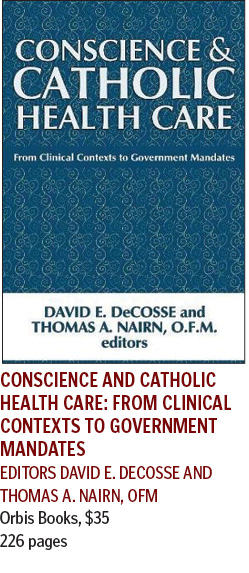BY: CARL MIDDLETON, DMIN, ND, MDIV, MA, MRE
 When it comes to anthologies, especially with 14 authors, a book may be disjointed and lack focus. However, this is not the case with Conscience & Catholic Health Care. The book is well organized with a common theme and purpose. The editors, David E. DeCosse and Thomas A. Nairn, OFM, have done an excellent job of maintaining consistency, connectivity and focus with practical applications.
When it comes to anthologies, especially with 14 authors, a book may be disjointed and lack focus. However, this is not the case with Conscience & Catholic Health Care. The book is well organized with a common theme and purpose. The editors, David E. DeCosse and Thomas A. Nairn, OFM, have done an excellent job of maintaining consistency, connectivity and focus with practical applications.
The overall purpose is to clarify ethical and theological issues related to conscience arising in Roman Catholic health care. The foundation of this book is the Catholic tradition of moral theology and the articulation of a compelling theology of conscience to assist Catholic health care to fulfill its mission.
The aim is to engage three distinct yet overlapping audiences: First is the "Catholic theology of conscience as reflected on by theologians deployed by bishops and shaped by the experience of countless patients and employees of Catholic health care institutions." Second is the practical world of Catholic health care where dedicated men and women have to make significant conscience decisions on a daily basis, and third is the secular, pluralist culture in which U.S. Catholic health care is practiced.
In this second volume — the first was published by Orbis Books in 2015 — each of the 14 chapters follows a similar methodology: explore the definition of conscience from a theological and philosophical perspective; examine the notion of conscience in light of the current context of Catholic health care; and discuss the implications for Catholic health care today.
The first five chapters are concerned with the notion and definition of conscience throughout the moral traditions and the insights of theologians such as Bernard Haring as developed by Ron Hamel in his chapter on "'Reciprocity of Consciences' and Catholic Health Care: Opportunities and Challenges." Other chapters on conscience and its formation include: "The Rhetoric of Conscience," "Conscience after Vatican II," "Dealing with Doubt" and "Does A Catholic Health Care Organization Have an Institutional Conscience?" (Both Fr. Nairn and Hamel have worked for CHA.)
In these chapters there is a consistent reference to Vatican II's definition of conscience and that of Pope Francis. In Vatican II's Gaudium et Spes: "Conscience is the most secret core and sanctuary of a man. There he is alone with God, whose voice echoes in his depths," and in Dignitas Humanae: "In all his activity a man is bound to follow his conscience in order that he may come to God, the end and purpose of life."
Pope Francis' notion of conscience holds that "the truth of Catholic teaching should be the result of the interplay between insights derived from the consciences of the whole church (and especially the consciences of the poor) and authoritative judgments made by the hierarchical magisterium." Pope Francis' quote from Amoris Laetitia: "the Church has been called to form consciences, not to replace them."
A few of the chapters note the significance of sexuality, gender and reproductive issues as the basis for current ethical dilemmas involving conscience. An example is the dispute of the Little Sisters of the Poor and their refusal to sign an exemption letter that would enable a third party to provide contraception to their employees. The second example is that of the Obama administration and the Affordable Care Act's mandate for health care institutions to provide preventive health services to women that would include contraception and sterilization.
Other chapters that explore the changing organizational and economic landscape of Catholic health care and the pluralist culture of the United States include: "ACLU v. Catholic Health Care;" "Forming Conscience in an Age of Radical Biomedical Discovery;" "Situating the Catholic Opposition to Physician-Assisted Suicide in the Context of Teachings of Pope Francis on Conscience and Mercy;" "The Inaccessible Conscience: the Case of Unrepresented Patients;" and "Conscience, Race and Health Care Disparities" to name a few.
This is an excellent book on conscience that I highly recommend. The chapters expand the notion of conscience that is consistent with the moral tradition and apply these concepts of conscience to the major issues confronting Catholic health care today.
Conscience & Catholic Health Care has many practical uses and is a great resource, especially for executive leaders, mission leaders and ethicists in the Catholic health ministry. It is an important work for chief executive officers to use with their executive leadership teams to read and discuss, especially applicable chapters that pertain to the conscience issues that are confronting Catholic health care today. Ethics committees and mission integration committees will find Conscience & Catholic Health Care most helpful in providing continuing education and robust discussion for its members. This book is a most resourceful anthology that will stand the test of time. I suspect your copy will soon have its cover tattered and worn.
CARL MIDDLETON is a retired health care executive, theologian/ethicist and senior mission leader with 45 years of ministry in Catholic health care.